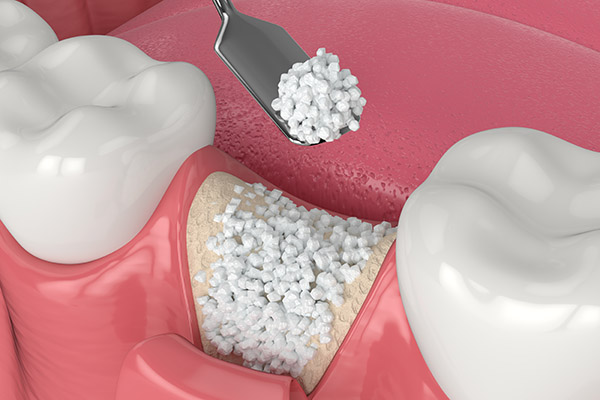 Implant dentistry involves the replacement of natural teeth after tooth loss occurs using titanium posts (known as dental implants) and the attachment of a restoration, such as a dental crown, dental bridge, or denture. A bone graft is often necessary before an implant dentistry procedure, particularly when there is not enough healthy bone inside the jaw to support the implants.
Implant dentistry involves the replacement of natural teeth after tooth loss occurs using titanium posts (known as dental implants) and the attachment of a restoration, such as a dental crown, dental bridge, or denture. A bone graft is often necessary before an implant dentistry procedure, particularly when there is not enough healthy bone inside the jaw to support the implants.
A bone graft before implant dentistry procedure explained
A bone graft involves grafting bone material inside of the jaw after bone loss occurs to ensure dental implants are adequately supported. This review discusses when a bone graft may be needed before an implant dentistry procedure, the benefits of a bone graft procedure, and more.
What is the purpose of a bone graft before an implant dentistry procedure?
The purpose of a bone graft before an implant dentistry procedure is to increase the amount of bone inside of the jaw. Otherwise, the dental implants may not have enough support and can increase the risk of dental implant failure, which complicates the teeth replacement process. Only patients who have experienced bone loss in the jaw require a bone graft procedure for implant dentistry.
How safe is a bone graft procedure?
A bone graft consists of taking bone from another part of the body (autograft) and grafting it inside of the jaw above or below where the implants will be placed. This is considered oral surgery, so sedation is required. There may also be a recovery period of time, although the risks are minimal and severe side effects are rare.
What are the benefits of a bone graft before implant dentistry?
As mentioned, the purpose of a bone graft is to replenish bone loss in the jaw, which may be necessary due to bone atrophy after the loss of one or more teeth or bone loss caused by periodontal disease. This also helps ensure the dental implants and restoration last for a long time without needing repair or replacement.
When is a bone graft procedure required?
A bone graft procedure is required if there is not enough bone inside of the jaw to adequately support full-sized dental implants long-term. As mentioned, this may be necessary due to atrophy or bone loss caused by periodontitis. A dentist can determine whether or not a bone graft procedure is necessary before implant dentistry during the first visit.
What happens after a bone graft procedure?
The placement of dental implants can be scheduled after a bone graft procedure. The mouth will need to heal after the bone graft, however, so the dentist may wait until the bone graft has been successful to schedule the placement of the dental implants.
Talk to our implant dentistry team about treatment
If you have one or more missing teeth and want to learn more about teeth replacement with implant dentistry, then contact us by phone or message today. During your first visit, we can discuss your treatment goals and put together a treatment plan that helps you achieve the smile of your dreams with implant dentistry.
Request an appointment or call Paramus Emergency Dental & Implant Center at 201-940-1931 for an appointment in our Oradell office.
Related Posts
Implant dentistry makes everyday activities easier. After tooth loss occurs, certain activities can become more of a challenge, and it can affect the person’s appearance and level of confidence. The good news is that many restore their confidence level and improve their ability to eat, speak, and care for their smile each day with implant…
Your implant dentist may refer to a part of your dental implant restoration as an “abutment.” For many, this is a new term, and understanding what the implant dentist means can be helpful to feel more comfortable about what you can expect with the treatment process and your restoration.A dental abutment is a connecting piece…
Implant dentistry offers a tooth replacement solution that looks and feels natural. This is due in large part to the implant, which fuses together with the jawbone and serves as the support and root of the replacement tooth. This review discusses the unique benefits of choosing implant dentistry to replace a missing tooth.The most notable…
